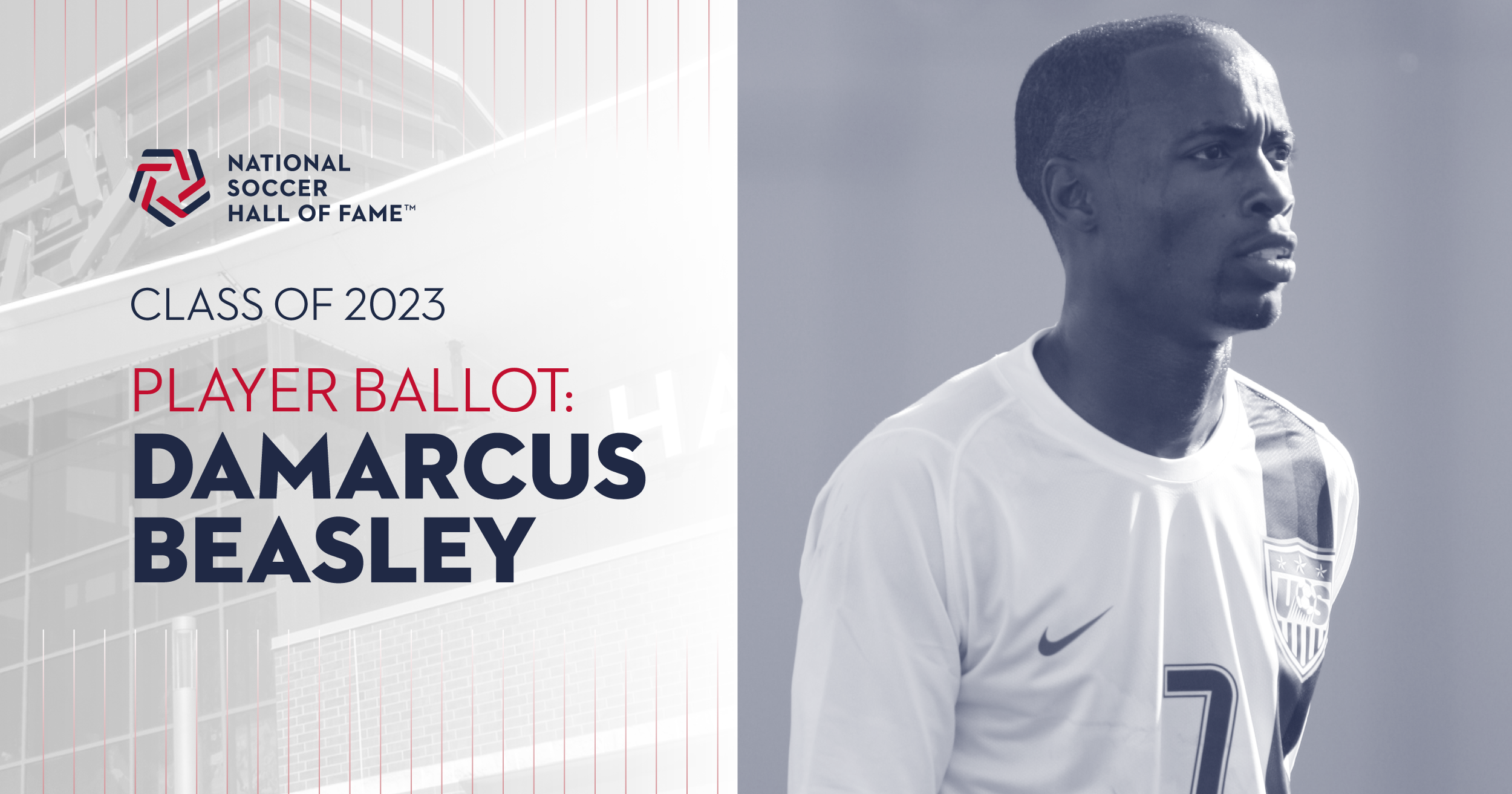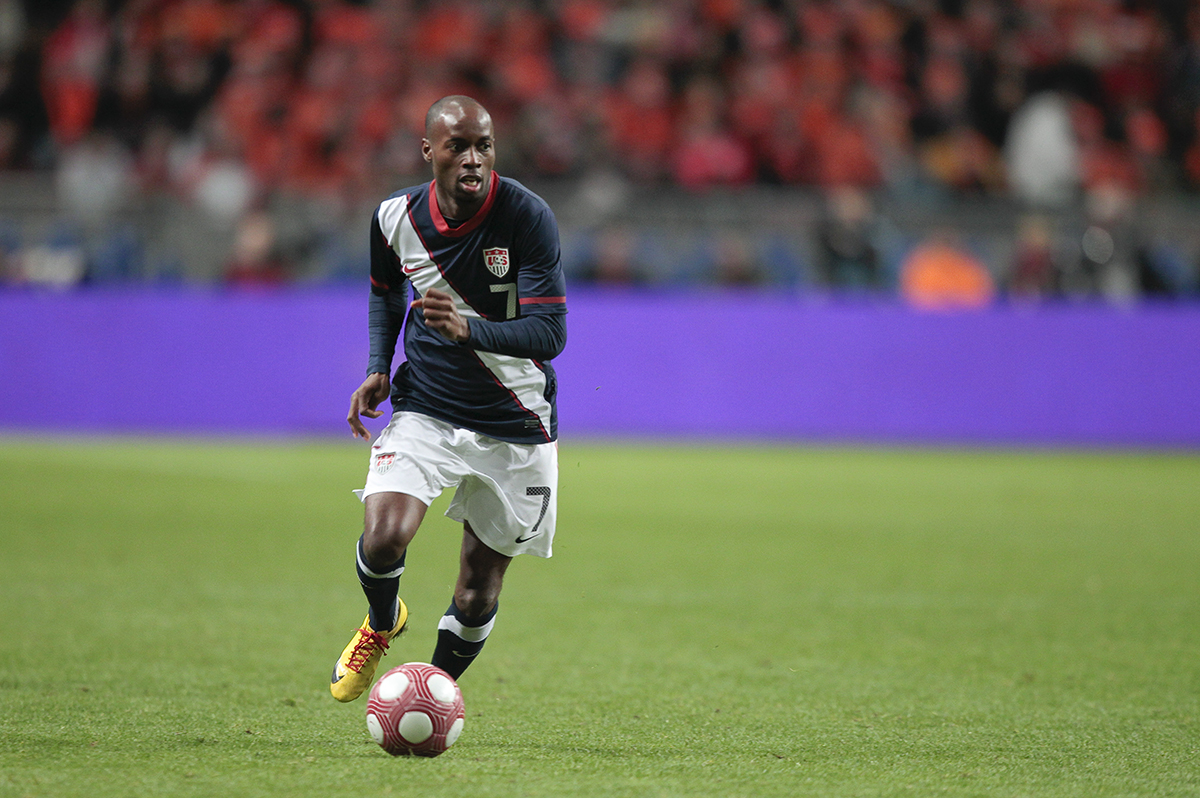It’s funny how life can work out.
As a 20-year-old, DaMarcus Beasley was the youngest member of the US Men’s National Team at the 2002 FIFA World Cup. And at his fourth World Cup a dozen years later, in 2014 in Brazil, Beasley found himself as a team elder and voice of experience at the age of 32.
Still, Beasley wasn’t very impressed with becoming the first USMNT player to compete in four World Cups.
“It’s been great, but I don’t really look at it like that,” he told US Soccer at the time. “I just look at it as another opportunity to push our country to another level. I’m not so much into individual accomplishments. This is just another opportunity for Americans to show how far we’ve come from 2010.”
That type of attitude helped define Beasley throughout his career.
Coupled with an impressive club career that saw him compete for top teams in England, Germany, the Netherlands, Scotland, Mexico and the US, Beasley left his mark on the sport in this country. For his outstanding career, Beasley was voted into the National Soccer Hall of Fame on the Player Ballot in his year of eligibility. He will be inducted into the Hall in Frisco, Texas, on May 6, 2023.

At 5-8 and 145 pounds, Beasley looked like a string bean. But as we have discovered, looks can be quite deceiving. “Beas,” as he was known by his teammates, was one tough dude who had plenty of speed to spare, whether he played as a winger or a fullback on the left flank.
“As a player, he was Gumby,” former US Men’s National Team head coach Bruce Arena told USSoccer.com in 2019. “He was fearless. He couldn’t be broken. He threw himself into tackles. He could go up and down the field. Obviously, he had very good attacking qualities, but he was a terrific defensive player as well. I always said he could play any position on the field except center back. It’s not surprising to me that at the tail end of his career, he’s become a left back. He’s just a real intelligent player.”
Beasley enjoyed one of the longest careers for a USMNT player, competing for two decades and for the national side over 16 years. He made 126 international appearances, finding the net 17 times.
Former USMNT captain and defender Carlos Bocanegra, who roomed with Beasley during their Chicago Fire days, recognized how reliable he was.
“You know something that always stood out to me about Beas? You could count on him in every game,” Bocanegra told USSoccer.com in 2019. “You knew what you were going to get. And that’s still true to this day. He would see passes early. He would run into spaces early. He would also do a couple of clever things: playing short corners early, getting free kicks back in play early to give us a counter or give us an advantage when the other team was asleep.
“He had those instincts. … Those are things you just can’t teach.”
Perhaps Beasley’s greatest asset was knowing his own strengths and weaknesses.
“I wasn’t the best player, I wasn’t the worst player,” he said in 2019. “But I think my mentality and what I brought to the game was always at a high level. That’s not just with goals and assists. That’s doing the little things the correct way, doing the dirty work and doing the extra work that it takes to win a game.”
Beasley rarely got rattled. He was Mr. Cool under pressure.
“You can’t really teach that,” he said at the 2014 World Cup. “That’s always been inside me whenever I played. I like the lights. I like playing in front of 80,000 people. It takes out the nerves, playing in World Cups or in the Champions League semifinals. That’s where you show you belong in this position.”

Like many children, Beasley and his brother Jamar played soccer because their father wanted them to run around while growing up in Fort Wayne, Ind. Both became professional players. Jamar enjoyed an 18-year career, competing in MLS, in the USL, with the US National Futsal team and in several indoor soccer leagues.
DaMarcus joined US Soccer’s Under-17 residency program in preparation for the FIFA U-17 World Cup in Australia in 1999. He and Landon Donovan led a talent-laden US side that finished fourth at the 1999 FIFA U-17 World Cup. Donovan won the Golden Ball, and Beasley won the Silver Ball. It was the only time US men’s players finished one-two in MVP voting at a FIFA-sanctioned tournament.
Their performances impressed Arena, who used the dynamic duo at the 2002 FIFA World Cup. Beasley was the youngest member of that squad, turning 20 during the team’s flight to South Korea. The Americans reached the quarterfinals, their second-best finish at a World Cup since a semifinal appearance in 1930.
“I think he saw something in us that was ingrained in us since we were 15 and 16 with John Ellinger and the Under-17 National Team — we just didn’t fear anybody,” Donovan said earlier this year. “I think he liked that as we were playing Portugal with all these big names, that we didn’t care. I mean, we respected them a lot, but we didn’t fear them. I think he liked that. I think it gave us a little bit of an edge because he had a few guys who are just willing to run themselves into the ground and weren’t fearful.”
Beasley also got a bit of advice from his veteran teammates.
“They said. ‘Just play. Enjoy it,’” he said in 2014. “That’s what I tell the young guys now. Even when we’re not on the field, enjoy the time, enjoy the experience. You never know when you’ll get another World Cup. Four years is a lot in football. You never know what’s going to happen in four years. So, once you’re in one, enjoy it, on and off the field.”
As a veteran, Beasley realized keeping his focus was his main priority.
“Obviously, you look at the game differently,” he said in 2014. “Mentally you have to be prepared, because physically when you’re 20 you can go run around and be fine and then go play another game the next day. I think the mentality part of it is what you learn when you get older, concentrating for 90 minutes — not 70, not 60. Being older, I’ve tried to improve that part of my game. I want to make sure I’m mentally in the game for 90 minutes and not 70 or 75.”
When he was called back into the USMNT in 2013, Beasley was ready to play whatever position head coach Jurgen Klinsmann needed him. He wound up at the left back.
“I’ve played a lot of different positions in the national team, from forward to left mid, right mid, center mid, in the back,” Beasley told Soccer America. “The left back came from the snow game against Costa Rica. He [Klinsmann] asked me if I could play it. Timmy Chandler was out. Fabian Johnson was out. Parky [Michael Parkhurst] was out. Every left back you could ever imagine was out. That was my first call-up for a while.
“He asked me if I could play it, so I said, ‘Yeah.’ That was it. He had confidence in me since that day to play that position, and here I am now.”
Beasley forged a club career that many would dream about.
At 16 years and 10 months of age in 1999, Beasley was the youngest player to sign with Major League Soccer at the time. He played with the MLS Project-40 team before joining the Chicago Fire the following year.
After playing big roles in two Lamar Hunt US Open Cup conquests (2000, 2003), one Supporters’ Shield and an MLS Cup final, both in 2003, Beasley felt it was time to challenge himself overseas. He signed with PSV Eindhoven of the Netherlands in July 2004.
“It’s bittersweet having to say goodbye to DaMarcus,” Fire coach Dave Sarachan told ESPN at the time. “He was the ultimate professional during his time in Chicago and will undoubtedly go down as one of the finest young players ever to suit up for the Fire.”
Beasley’s 10-year international odyssey also saw stops at Manchester City (England), Rangers (Scotland), Hannover 96 (Germany) and Puebla (Mexico) before returning home to play his final six seasons with the Houston Dynamo. He made 427 league appearances, finding the net 46 times.
Although he never won an MLS Cup during his stints with Chicago and Houston, Beasley earned several winners’ medals elsewhere. With PSV Eindhoven, Beasley won the Dutch Eredivisie twice (2004–05, 2005–06) and KNVB Beker (2004–05). There were more spoils with Rangers, capturing the Scottish Premiership (2008-09, 2009-10), Scottish Cup (2007-08, 2008-09) and Scottish League Cup (2007-08, 2009-10).
After returning to MLS, he captained the Dynamo to Open Cup glory in 2018.
“This one is special,” Beasley told MLSSoccer.com. “To win this one at such an old age — obviously my career is winding down — this is something I’ll never forget. The players, the coaches put so much effort into trying to win this cup for ourselves. It’s even sweeter because of the season we’ve been having.”
Beasley retired from the USMNT at least twice – at the end of 2014 and after a brief recall during the 2015 CONCACAF Gold Cup. When Arena returned to the National Team in 2017, he asked Beasley – then 35 years old – to return once more. With his participation in the Hexagonal that year, Beasley became the first USMNT player to appear in qualifiers for five different World Cups.
Two years later, he hung up his boots for good, walking off the field one last time after Houston defeated the LA Galaxy in its regular-season finale on Oct. 6, 2019.
“I play with a smile on my face,” he said. “That is who I am. That what I am about. I just want to play the game and that’s it. There was nothing different the last 500 to this game; obviously it’s the last one, but I always want to win.”
Now 40, Beas hasn’t gone too far away from the game — or his hometown, for that matter. In October 2020, he became part of the Fort Wayne FC ownership group, where he serves as sports operations director for the USL League Two club.
“Being involved with a group to bring professional soccer to my hometown is truly a dream come true,” Beasley said. “I’m extremely excited to get started with this new challenge and to work side by side with the Fort Wayne community.”
.